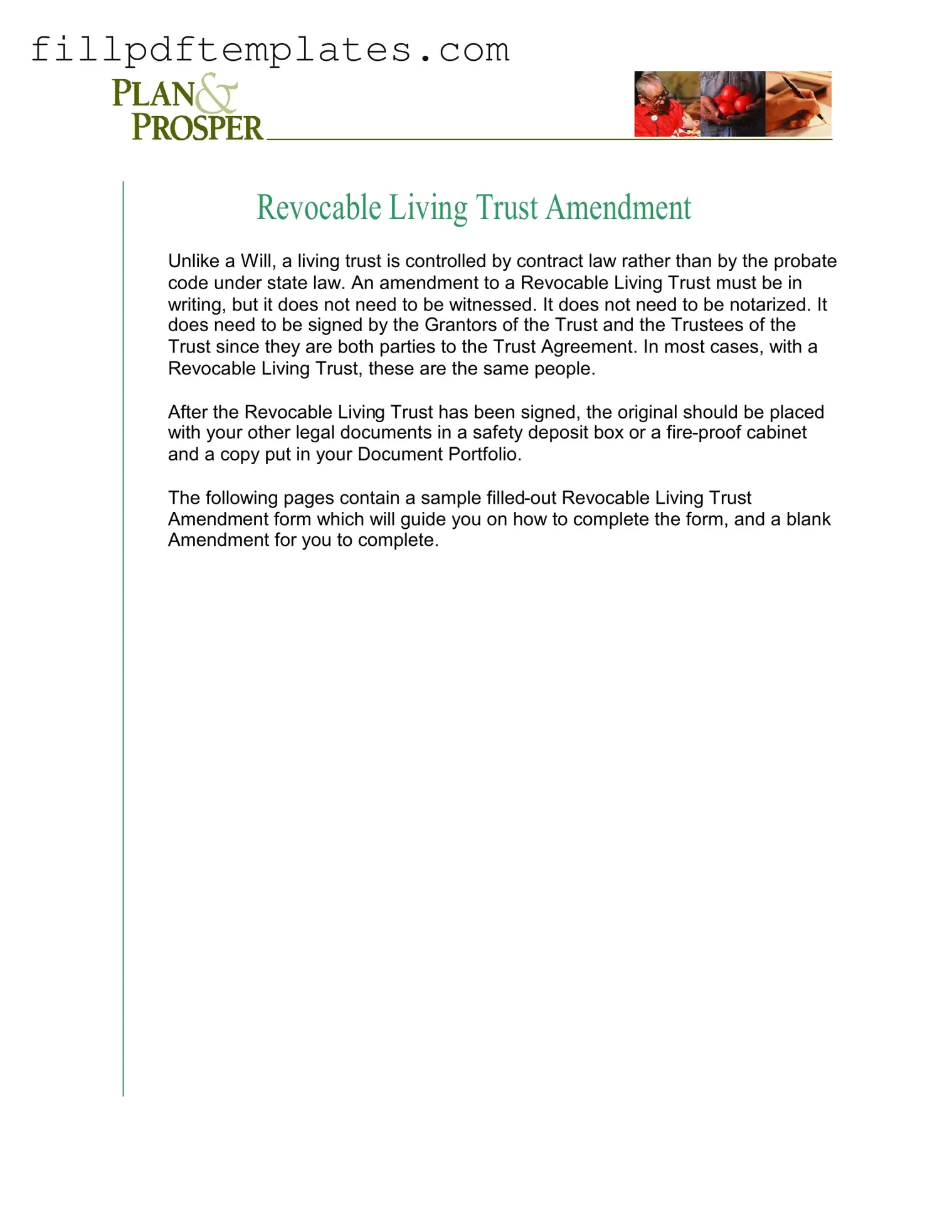Fill a Valid Trust Amendment Template
The Trust Amendment form is an essential tool for anyone managing a Revocable Living Trust. This form allows Grantors—the individuals who create the trust—to make changes or updates to the original Trust Agreement without the complications often associated with a Will. Unlike Wills, which are governed by probate laws, living trusts operate under contract law, providing a more flexible framework for modifications. To amend a Revocable Living Trust, the process is straightforward: the amendment must be in writing and signed by both the Grantors and the Trustees. Notably, it does not require witnesses or notarization, making it easier for individuals to adapt their trusts as their circumstances change. Once the amendment is completed, it should be stored safely with other important legal documents. The Trust Amendment form not only includes a sample filled-out version to guide users but also provides a blank template for personal use. By understanding how to properly utilize this form, individuals can ensure their trusts reflect their current wishes and needs.
Additional PDF Templates
Skin Assessment Shower Sheets for Cna - This form is used to document visual assessments of residents' skin conditions.
Test Drive Form Pdf - It is designed to provide both peace of mind and clarity to the test driving process.
The USCIS I-864 form, also known as the Affidavit of Support, is an essential document required when an immigrant seeks a green card through family sponsorship. This form demonstrates that the sponsor has sufficient income to support the immigrant, ensuring they won't rely on government assistance. For a helpful resource on this process, visit legalpdfdocs.com. Ready to start the process? Fill out the form by clicking the button below.
Broward County Animal Care and Adoption - The form’s thoroughness promotes informed decisions by pet owners.
Similar forms
- Will: A will outlines how a person's assets will be distributed after their death. Like the Trust Amendment, it must be in writing and signed by the individual making the will. However, a will usually requires witnesses to be valid.
- Power of Attorney: This document allows someone to make decisions on behalf of another person. Similar to a Trust Amendment, it must be signed by the person granting the power. It does not require witnesses or notarization unless specified by state law.
- Living Will: A living will specifies a person's wishes regarding medical treatment in case they become unable to communicate. Like a Trust Amendment, it is a written document that does not require witnesses or notarization in most states.
- Health Care Proxy: This document appoints someone to make health care decisions for another person. Similar to the Trust Amendment, it must be signed by the person granting authority but may require witnesses depending on state laws.
- Deed: A deed transfers ownership of property from one party to another. Like a Trust Amendment, it must be in writing and signed by the parties involved. It may also need to be notarized to be effective.
- California Motor Vehicle Bill of Sale: The California Motor Vehicle Bill of Sale form records the sale and purchase of a motor vehicle in California. It provides essential information about the transaction, including details of the buyer, seller, and vehicle itself. This form acts as proof of transfer of ownership and is crucial for the registration process; view the document.
- Change of Beneficiary Form: This form allows individuals to change the designated beneficiaries of their insurance policies or retirement accounts. Similar to a Trust Amendment, it is a written document that typically requires the signature of the policyholder but does not usually need witnesses.
Document Specifics
| Fact Name | Description |
|---|---|
| Governing Law | The Revocable Living Trust Amendment is governed by contract law rather than probate code. |
| Written Requirement | An amendment must be in writing to be valid. |
| Witness Requirement | The amendment does not need to be witnessed. |
| Notarization | No notarization is required for the amendment. |
| Signatures Required | Both Grantors and Trustees must sign the amendment. |
| Document Storage | The original document should be stored in a safe place, such as a safety deposit box. |
| Sample Forms | A sample filled-out form and a blank form are provided for guidance. |
| Modification Rights | Grantors reserve the right to amend or revoke the Trust Agreement as specified in the document. |
Things You Should Know About This Form
-
What is a Trust Amendment?
A Trust Amendment is a legal document used to modify the terms of an existing Revocable Living Trust. This amendment allows the Grantor(s) to make changes to the Trust Agreement without needing to create an entirely new trust. It is an essential tool for adapting the trust to changing circumstances or wishes.
-
Who needs to sign the Trust Amendment?
The Trust Amendment must be signed by both the Grantor(s) and the Trustee(s). In most cases, these roles are filled by the same individuals. Their signatures confirm their agreement to the modifications made in the amendment.
-
Does the Trust Amendment need to be notarized or witnessed?
No, a Trust Amendment does not require notarization or witnesses to be valid. However, it must be in writing and signed by the relevant parties. This simplifies the process of amending the trust.
-
What should I do with the original Trust Amendment once completed?
After signing the Trust Amendment, it is advisable to store the original document in a safe place. Options include a safety deposit box or a fire-proof cabinet. Keeping it with other legal documents ensures it is accessible when needed.
-
How does a Trust Amendment differ from a Will?
A Trust Amendment is governed by contract law, while a Will is regulated by probate law. This distinction means that changes to a trust can be made more easily and without the formalities required for a Will. Trusts often avoid the probate process entirely, providing a smoother transition of assets upon the Grantor's passing.
-
Is there a specific format for a Trust Amendment?
While there is no strict format required, the amendment should clearly state that it is an amendment to the existing Trust Agreement. It should include the names of the Grantor(s) and Trustee(s), the date, and the specific changes being made. Sample forms are often provided to guide individuals in completing their amendments correctly.
-
Can I revoke my Trust Amendment after it has been signed?
Yes, as the Grantor, you have the right to revoke or further amend your Trust Amendment at any time, as long as you are mentally competent. This flexibility allows you to make adjustments as your circumstances or intentions change.
Documents used along the form
When amending a Revocable Living Trust, several other documents may also be relevant. Each of these forms serves a specific purpose and can help ensure that your estate planning is comprehensive and clear.
- Revocable Living Trust Agreement: This is the foundational document that establishes the trust. It outlines the terms, conditions, and the roles of the Grantors and Trustees.
- Pour-Over Will: This document works in conjunction with a trust. It directs that any assets not placed in the trust during the Grantor's lifetime will be transferred into the trust upon death.
- Durable Power of Attorney: This allows someone to make financial decisions on behalf of the Grantor if they become incapacitated. It ensures that financial matters are handled according to the Grantor’s wishes.
- Healthcare Power of Attorney: Similar to the Durable Power of Attorney, this document designates an individual to make healthcare decisions for the Grantor if they are unable to do so themselves.
- Living Will: This document expresses the Grantor's wishes regarding medical treatment and end-of-life care. It guides healthcare providers and loved ones in making decisions that align with the Grantor's values.
- Trust Certification: This document verifies the existence of the trust and provides details about its terms and the identity of the Trustees. It can be useful when dealing with financial institutions.
- Operating Agreement Form: To effectively manage your LLC, consider utilizing the detailed Operating Agreement form resources that clarify member roles and responsibilities.
- Change of Beneficiary Forms: If the trust or estate plan includes life insurance policies or retirement accounts, these forms ensure that beneficiaries are updated according to the Grantor's wishes.
- Asset Inventory List: This document details all assets included in the trust. It helps in managing and distributing the trust’s assets according to the Grantor's wishes.
Using these documents alongside the Trust Amendment can provide clarity and ensure that your estate plan reflects your current wishes. It is essential to keep all documents organized and accessible for your Trustees and beneficiaries.
Trust Amendment Preview

Revocable Living Trust Amendment
Unlike a Will, a living trust is controlled by contract law rather than by the probate code under state law. An amendment to a Revocable Living Trust must be in writing, but it does not need to be witnessed. It does not need to be notarized. It does need to be signed by the Grantors of the Trust and the Trustees of the Trust since they are both parties to the Trust Agreement. In most cases, with a Revocable Living Trust, these are the same people.
After the Revocable Living Trust has been signed, the original should be placed with your other legal documents in a safety deposit box or a
The following pages contain a sample

THE
REVOCABLE LIVING TRUST
AMENDMENT
THIS |
|
|
|
|
AMENDMENT to the Trust Agreement made this |
|||||||||||||||
|
|
|
day of |
, |
|
|
|
|
executed between |
|||||||||||
|
|
|
|
|
|
|
|
|
|
|
|
|
|
|
|
|
|
, hereinafter |
||
referred to as the Grantor(s) and |
|
|
|
|
|
|
, |
|||||||||||||
hereinafter referred to as the Trustee(s). |
|
|
|
|
|
|
|
|
||||||||||||
WHEREAS, the Grantor(s) and the Trustee(s) entered into a Revocable Living Trust
dated, hereinafter called the Trust Agreement, and
WHEREAS, Articleof the Trust Agreement provided that the
Grantor(s) reserve(s) the right to amend in any manner or revoke in whole or in part the Trust Agreement, and
WHEREAS, the Grantor(s) is/are desirous of modifying and amending the Trust Agreement and the Trustee(s) is/are agreeable to the modification and amendments contained herein,
NOW THEREFORE, IT IS AGREED:

IN WITNESS WHEREOF, Grantor(s) has hereunto subscribed his/her name |
to the |
||||||||||
Amendment to this TRUST this day of |
, 20 |
. |
|||||||||
|
|
|
|
|
|
|
|
|
|
|
|
GRANTOR |
|
|
|
|
|
STATE OF |
) |
|
|
|
|
|
) SS |
|
|
|
|
COUNTY OF |
) |
|
|
|
|
The foregoing instrument was acknowledged before me this |
|
day of |
, |
||
|
|
|
|
|
|
20, by the Grantor.
SEAL
Notary public:
My Commission Expires:
1

THE
REVOCABLE LIVING TRUST
AMENDMENT
THIS |
AMENDMENT to the Trust Agreement made this |
||||||||||
|
|
|
day of |
, |
executed between |
||||||
|
|
|
|
|
|
|
|
|
|
|
, hereinafter |
referred to as the Grantor(s) and |
|
|
|
|
|
|
, hereinafter |
||||
referred to as the Trustee(s). |
|
|
|
|
|
|
|||||
WHEREAS, the Grantor(s) and the Trustee(s) entered into a Revocable Living Trust
dated, hereinafter called the Trust Agreement, and
WHEREAS, Articleof the Trust Agreement provided that the
Grantor(s) reserves the right to amend in any manner or revoke in whole or in part the Trust Agreement, and
WHEREAS, the Grantor(s) is desirous of modifying and amending the Trust Agreement and the Trustee(s) is agreeable to the modification and amendments contained herein,
NOW THEREFORE, IT IS AGREED:

IN WITNESS WHEREOF, Grantor(s) has hereunto subscribed his/her name to the
Amendment to this TRUST this |
|
day of |
, 20 |
. |
||
|
|
|
|
|
|
|
GRANTOR |
|
|
|
|
|
STATE OF |
) |
|
|
|
|
|
) SS |
|
|
|
|
COUNTY OF |
) |
|
|
|
|
The foregoing instrument was acknowledged before me this |
|
day of |
, |
||
|
|
|
|
|
|
20, by the Grantor.
SEAL
Notary public:
My Commission Expires:
